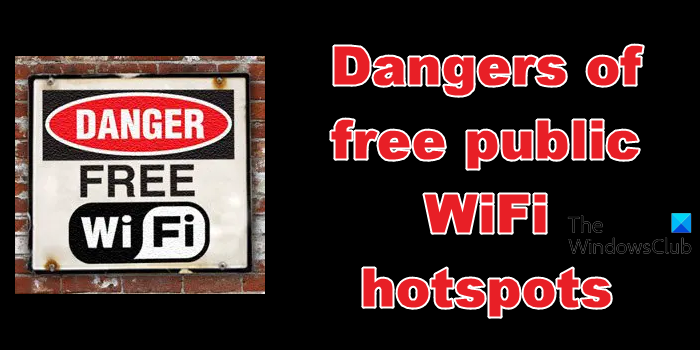Nowadays, free Wi-Fi is available almost everywhere – in cafes, Hotels, and Offices – and even in the streets and general public places. Who is not tempted to use free WiFi to check their mail and social media updates? Well, today, we will see the dangers of free public WiFi hotspots, most of which you probably already know.
Dangers of free WiFi

The main risk of using free public WiFi is the potential for cybercriminals to compromise the network and intercept your data. This can lead to identity theft, financial fraud, and malware installation. Always ensure a secure, encrypted connection to protect your sensitive information while using public Internet access.
How to hack Computers at Public WiFi Hotspots
I am not giving a step-by-step procedure to hacking. I never tried it. You can visit the Darknet for tutorials on the topic. Darknet is the non-indexed part of the Internet where crime thrives.
So how does this happen? The Hacker places himself between you and the WiFi network and intercepts everything you send, including passwords, emails, credit card information and other data. He can then misuse this information. This is called as the Man in the Middle Attack.
But one need not really get to the Darknet and search for tutorials on how to hack. There is plenty of software available on the regular Internet, as well, to help you hack others’ computers and mobile devices. For example, you can download software that converts your laptop into a WiFi Hotspot – if your computer is already connected to the Internet. If you use that software at a public place, others there will confuse your computer with the public hotspot and will connect to it without giving it a second thought. The Hacker could thus set up a free WiFi point and hope you connect to it – or he can even force your device to connect to it. He then steals all the information that you transmit.
With the help of such software, you can have a setup to peep into other computers and tablets or even smartphones connected to your computer, assuming it to be a public WiFi. With a little luck, you can also find software that might help you take over others computers and do what you want instead of what the actual user wants.
This section aims to provide you with information on how easy it could be to hack others’ Internet devices using different software in a public place. It also tells you what risks you are at, when at a public place and willing to use their hotspots. It does not teach you, however, to hack others’ computers. The only way around here is to avoid using the public hotspot and carry an Internet dongle or card of your own. And never to use a hotspot that does not have a password, as it may not be a real hotspot.
Read: Wi-Fi security when Traveling.
What information can be Hacked at Public WiFi
If a person manages to access your computer, he or she can easily check out what you are doing – by checking out the packets incoming and outgoing from your computer. She or he may also access your screen to see what windows are open and what you are working at. The person may also check into your browsing history and see what you were looking at, until a few minutes ago. It depends on the time you are at the public place and how the patient is the hacker.
The hacker may also take control of your computer and redirect you to other websites rather than the ones you wish to access. Sometimes, it may be lookalikes of the website you wish to visit and may steal the password and ID required to log in – just as phishing works. Sniffing the outgoing and incoming packets on the hacked network, too, allows the criminal to figure out the websites you are using and the login credentials for the sites.
Besides, the hacker may know your operating system, computer configuration, browsers you have been using, and other similar information. In short, the criminal-minded may access all the data on your computer as if he or she were using your computer with your permission.
Precautions to take while using Free WiFi hotspots?
Avoid using public hotspots as much as you can. Never go for financial transactions on public hotspots. Free Wi-Fi hotspots are not always safe due to risks of malware, phishing attacks, and data interception by cyber criminals. Public connections may lack strong security, making it easier for attackers to compromise your device or steal sensitive information.
- Use a VPN freeware and generally take some basic steps to secure yourself at public WiFi hotspots.
- Implement two-factor authentication wherever possible.
- Only visit websites with HTTPS encryption when you need to log in.
- Disable the automatic Wi-Fi connectivity feature on your phone.
When using free Wi-Fi, avoid accessing bank accounts, personal or sensitive information, and online shopping to protect against security breaches. Additionally, never leave your device unattended, and always be cautious, as no public Wi-Fi is completely secure.
Learn how to fix Public and Home Wi-Fi Network vulnerabilities. On a related note, do read this post on Is WiFi safe for your health, children, and at home?
Very true, and simple yet powerful advice for the average mobile user. Only thing I can think of for most casual hotspot users: I’ve heard some hackers, when you’re using a VPN so they can’t Wireshark your usage if you connected to them w/o knowing, will get a list of devices on their spoofed (or the real) hotspot network, then try to ping-for-ports to establish remote connection…make sure ports are “stealthed”, and that OS/firewall further blocks all incoming connections, on top of using a good VPN.
Hmm I shall have to be more careful although I thought I was, it never hurts to take advice